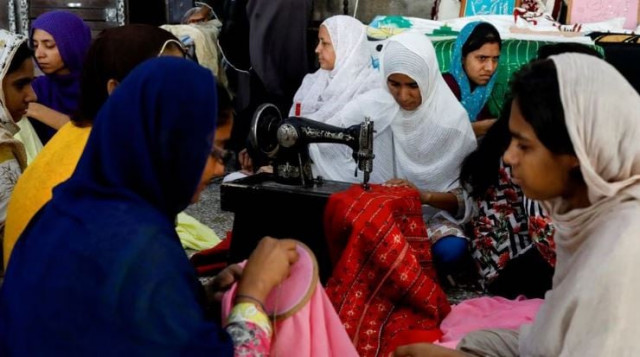Home-based workers endure devaluation
Informal sector strains workers, lacking regulation and causing low earnings

Shoppers eyeing an exquisite designer dress for its intricate embroidery or glimmering embellishments happily pay a hefty lump sum to the brand. However, the cottage workers, who spend hours delicately crafting each inconspicuous tussle or bead for the apparel, are not only underpaid but are also highly undervalued.
Despite the informal sector comprising a sizeable portion of Pakistan’s economy, the sheer absence of government regulation on the cottage industry has downgraded the value and finances of millions of home-based workers across the country, who in the absence of laws, microfinance options, and subsidies, have to singlehandedly bear high utility costs, alongside dealing with the fraudulent behavior of middlemen, who pay them only a minute percentage of their earnings for their hard work.
Ayesha Ali, a home-based worker from Bahawalpur, designs soutache braids and brocade fabrics for sale in a local clothing market. “Since cottage workers, especially women, do not have direct access to the market, it is very difficult to get a fair price for our items.
When we hire a middleman, they take a significant portion of our earnings as commission, due to which we barely earn enough profit to cover our capital investment.
Read Quiescent sericulture sector impoverishes households
As a result, my family and I are going through severe financial difficulties,” lamented Ayesha, who feels that her remuneration is inconsistent with the amount of time and effort that goes into sewing her handmade embellishments.
Similarly, Sheikh Naveed, a cottage worker involved in the production of garments, shared his struggle trying to bargain a decent amount in return for his sold items.
“There is no system in place to deal with the middlemen or retailers who take advantage of cottage workers and make it hard for us to make ends meet,” deplored Naveed.
On the other hand, cottage workers like Kiran, who runs her home-based food business in Lahore, narrate encountering a similar quandary. “I prepare selected food items at home
and sell them at the canteen of a nearby school.
However, I cannot expand my business since microfinance banks deny loans to cottage workers and private moneylenders demand 100 per cent interest,” resented Kiran, who had her house raided by moneylenders when she could not pay back her loan.
Read Women demand equal pay, better working conditions
According to Anum Naeem, an economist, Pakistan currently has no laws in place to regulate dealings in the cottage industry because of which the turnover of small and medium-sized industries is rapidly declining.
“The government must gather information on the number of workers involved in the cottage industry and exempt them from taxes. The State Bank should formulate a policy mandating commercial banks to provide interest-free and collateral-free loans to domestic industries, in order to promote their growth and bolster the country’s economy,” asserted Naeem.
Speaking to The Express Tribune on the matter, the General Manager Outreach at the Small and Medium Enterprises Authority (SMEDA), Raja Hassanien Javed said, “There is no registration or record of the cottage industry.
However, some organizations like Akhuwat offer loans to workers for purchasing capital like sewing machines. The majority of cottage companies are run by women, who sell their items to shopkeepers on loans, due to which their business remains limited.”
Published in The Express Tribune, December 3rd, 2023.



















COMMENTS
Comments are moderated and generally will be posted if they are on-topic and not abusive.
For more information, please see our Comments FAQ